Grumbles from the Grave (29 page)
Read Grumbles from the Grave Online
Authors: Robert A. Heinlein,Virginia Heinlein
Tags: #Authors; American - 20th century - Correspondence, #Correspondence, #Literary Collections, #Letters, #Heinlein; Robert A - Correspondence, #Science Fiction & Fantasy, #20th century, #Authors; American, #General, #Language Arts & Disciplines, #Science Fiction, #American, #Literary Criticism, #Science fiction - Authorship, #Biography & Autobiography, #Authorship

Hugh Farnham and his family are caught in the blast of an atom bomb, but are not killed. Instead, they are dumped into the far future, to a world none had envisaged. They are soon taken captive. Here the people who call themselves a master race are black, and they consider all other humans little more than animals, to be made slaves, tortured, or killed at will. Farnham is a slave now.
But eventually he interests the masters enough to gain a very limited freedom. He learns of the existence of a "time machine." With it, he manages to get his group back to a little before the time of the blast.
They take refuge in a cave in an enclave in the hills and prepare. The war comes, the nuclear blasts occur, and then plague strikes. But they survive.
March 9, 1963: Robert A. Heinlein to Lurton Blassingame
The new novel ([
Farnham's Freehold
] working title:
Grand Slam
) I did in 25 intense days, 503 pages. Ginny seems to like it better than
Glory Road,
says it moves fast and can't be cut much. However, I intend to cut it a lot and get it to my typist about the end of this month. I haven't read it yet, but enjoyed it as I wrote.
March 21, 1963: Lurton Blassingame to Robert A. Heinlein
I don't know how you manage to produce a novel of 500 pages in 25 days, even a first draft.
July 8, 1963: Lurton Blassingame to Robert A. Heinlein
Good story in
Farnham's Freehold,
with enough adventure for some of the men's magazines.
August 21, 1963: Lurton Blassingame to Robert A. Heinlein
Peter [Israel] said he was writing you about cutting and revision ideas, and you probably have his letter by now.
October 4, 1963: Lurton Blassingame to Robert A. Heinlein
Peter Israel says, "Bob Heinlein is the boss. I'll express my opinions, but I have enough respect for his skill and judgment so that if he says a thing can't be done, I'll go along with the way Bob feels it has to be done. If he says the story cannot be cut below 100,000 words without seriously hurting it, I'll publish it at 100,000."
October 12, 1963: Robert A. Heinlein to Lurton Blassingame
Farnham's Freehold
contract with Putnam's: On page two I have changed the wordage to "100,000" and struck out the delivery date and made it "to be arranged." I need to know [their] absolute rockbottom deadline for fall '64 publication. I know that he does not need the finished ms. by New Year's Day, that being what I struck out—nor could I deliver it by then in a smooth, retyped form; I've got too much to do to it, and my typist will need at least two months after I have finished cutting it. When you ask him for his absolute deadline, please point out to him that in twenty-five years I have never missed a deadline by even one day. I am quite sure that most editors stick at least a month of cushion into a deadline date since most writers are notoriously un-punctual in such matters. I want to know what his
real date
is. I will meet it.
THE MOON IS A HARSH MISTRESS
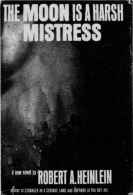
(173)
The Moon Is a Harsh Mistress
was originally titled
Brass Cannon
after the cannon the Heinleins bought on a trip to Louisiana.
While checking on "Mike," the computer that controls most functions on the Moon, Mannie finds that Mike has become conscious. Then Mannie finds himself heading the revolutionary movement with the Prof, the girl Wyoh, and Mike—who can assume many roles on the screen. The Moon was settled by convicts, but now enjoys a rich social life, though still badly exploited by Earth as master.
With the Prof's knowledge of history and Mike's powers, they plan a careful flight for freedom, using the catapults designed to sling their products to Earth to hurl rocks. Earth retaliates with nukes, but eventually surrenders. Mike, however, has been badly shaken by a nuclear strike. He still controls all electronics—but he no longer shows signs of consciousness.
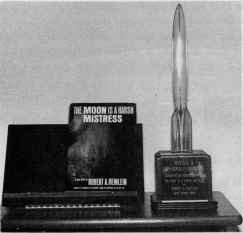
(174)
The Moon Is a Harsh Mistress
won the Hugo Award for Best Novel of 1966 at the World Science Fiction Convention, New York.
June 21, 1965: Robert A. Heinlein to Lurton Blassingame
The original of this letter goes with the original ms. of
The Brass Cannon
[
The Moon Is a Harsh Mistress
], the carbon goes with the carbon ms. Both will be sent to you tomorrow, original by airmail in the early morning, carbon by air express in the late afternoon, in an attempt to have them go by different airplanes. As you probably know from the news, we are isolated other than by air—and the last I heard they were borrowing 1916 Curtiss pushers in order to move all the passengers, freight, mail, and food that is moving in and out of our small airport.
Anent ms.: Please send the original to Putnam; it has with it a form for their supercolossal prize contest. But would you please tell him that I really have no expectation of a science fiction novel winning. . . .
July 6, 1965: Lurton Blassingame to Robert A. Heinlein
Putnam's likes new book, same terms as last book. Don't like title; can you suggest another?
November 30, 1965: Robert A. Heinlein to Lurton Blassingame
You saw a copy of ----'s letter to me; I phoned him today. He had thrown me a curve in his proposals to edit a ms. which ---- had approved in toto—but I tossed him another curve back saying okay and how quickly could he ship me the edited ms. for my approval?—and pointed out to him that I had
never
signed a contract in the past with Putnam's, nor accepted any advance, until the ms. was fully approved down to the least word. I think he was taken aback by this, but he quickly agreed to go over the ms. himself, see what the copy editor had done, and then either okay it the way I had submitted it, removing the copy editor's changes, or send it to me for my approval.
THE PAST THROUGH TOMORROW
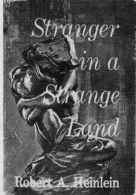
(175)
The Past Through Tomorrow
collected Heinlein's "Future History" stories written for
Astounding
and the slicks.
This is a giant collection of the stories written for
Astounding
under the "Robert A. Heinlein" byline and many of the slicks. These stories all follow a consistent pattern of future history. When he began writing fiction, Heinlein laid out a big chart with the dates, major technical advances, political and sociological situation, and various remarks necessary for fuller understanding. There were also lines for the lifelines of major characters and for the beginning and duration of technical inventions. This came to be known as his "Future History" chart. The big chart was pinned to the wall, and stories, characters, and details were added to it as more stories were written or planned. It covered a period from about 1950 to the year 2200.
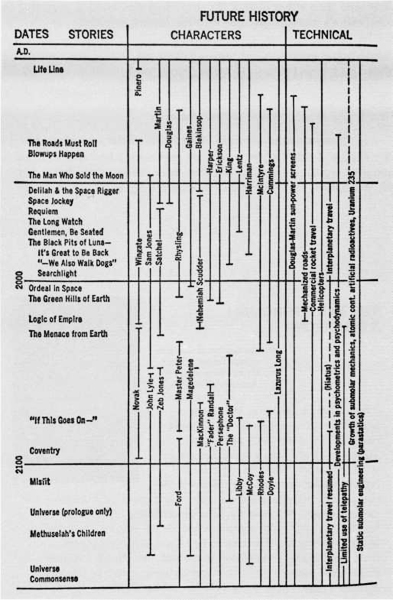
(176)
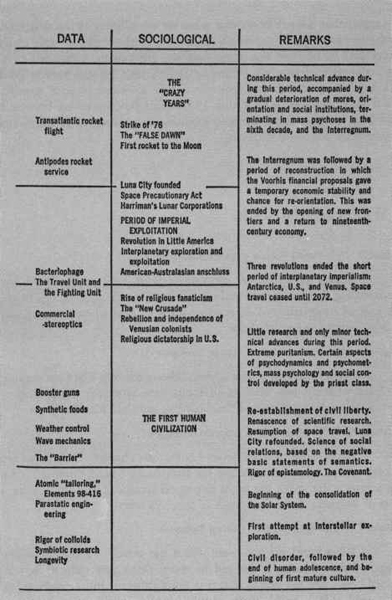
(177)
Chart of Future History from
The Past Through Tomorrow.
March 9, 1963: Robert A. Heinlein to Lurton Blassingame
I am returning herewith Peter Israel's letter concerning the
Future History.
I don't know just what he wants. I had had in mind an omnibus reprint book, using the first three books of the
Future History.
We hold all rights to these
and we own the plates.
* * *
I suggest that we tell Israel that what we are offering is the first three volumes, for reprint, separately or as one jumbo volume—with plates furnished by us—and that if he does not want them, please tell us so in order that we may offer same to Doubleday's Science Fiction Book Club. I feel quite sure that they would take a chance on such an offer, with the plates laid in their laps. These three books are very famous in the field and they have not been available in hardcovers in years—and never from the S-F book club.
I WILL FEAR NO EVIL
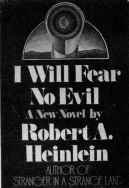
(179)
I Will Fear No Evil,
G.P. Putnam's Sons, 1970, was also serialized in
Galaxy.
Johann Sebastian Bach Smith, an extremely wealthy man, is being kept alive through the use of life support systems, until a suitable body donor can be found, at which point his brain will be transplanted into the young body. The body turns out to be that of his very capable secretary, who was killed by a mugger.
The two personalities now inhabit the same body and talk to each other. And Johann Smith learns to look around him with new eyes, as a female. He/she has experiences unknown to anyone else, having been of both sexes.
